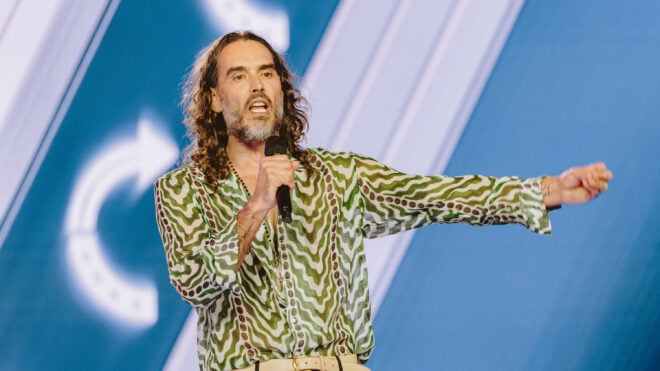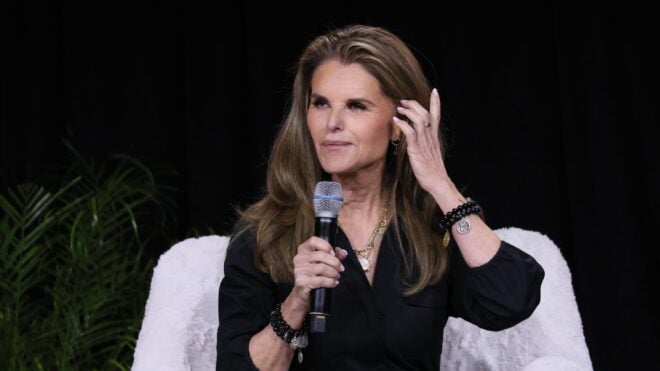A few weeks ago, I started watching Unorthodox on Netflix. The four-part series is pretty incredible, to be totally honest. Unorthodox follows the story of Esty, a young woman who is a member of an ultra-Orthodox community in the Williamsburg neighborhood of Brooklyn. At the age of 19, she decides to leave her Satmar Hasidic community and to travel to Berlin, totally alone.
I won't get into any more details, because the series is truly worth your time. Once I started it, I had a really hard time stopping, so definitely plan to watch it when you have at least two hours (if not four for the entire thing) at your disposal.
About halfway through the series, I read an article that was about Deborah Feldman, who is the real-life mom who is the inspiration for Esty. I paused after the second episode so I could learn more about Deborah, and I was truly amazed at everything she has been through — and that she continues to tell her story.
Like Esty, Deborah grew up in an ultra-Orthodox community in Brooklyn. And like Esty, Deborah was raised by her grandmother after her own mother left the community. Deborah's mother came out as gay and left her community because her sexuality wasn't tolerated. Unlike Esty's mother, who moves out of the country, Deborah's mother stayed in Brooklyn but was unable to play a major role in her daughter's life.
Deborah wrote about her journey in her book, Unorthodox: The Scandalous Rejection of My Hasidic Roots, which the show is loosely based on. The book was published when Deborah was 25. On her site, the description reads:
"In this arresting memoir about growing up in — and ultimately escaping from — a strict Hasidic community, Deborah Feldman reveals what life is like trapped within a religious sect that values silence and suffering over individual freedoms."
Netflix has also included a 20-minute documentary alongside the show that's called Making Unorthodox. Deborah is featured in the documentary, and she explains several things about the ultra-Orthodox community as it goes along. For starters, she says the ultra-Orthodox community was "founded by people who are struggling with the most immense trauma we can imagine." Most of the community are Holocaust survivors or are their direct descendants.
For those who are unfamiliar with the community, a lot of their rules and social norms may feel confusing or even wrong. There are a lot of rules about women in particular that can be hard to understand. For one, women shave their heads after they get married, and they wear wigs because their uncovered hair is considered to be the same as being naked. For another, they are considered "impure" while they are menstruating.
Like Esty, Deborah had her own arranged marriage at the age of 17. She had only met her husband, Eli, twice before their wedding day. Their union was fraught with tension, particularly as Deborah was contending with an undiagnosed medical condition that made a lot of marital relations uncomfortable and even painful.
Deborah says that at the age of 17, she also just wasn't ready for that kind of relationship. In 2012, she explained, "I was not ready for sex or interested in having sex and being forced into it by the people, my family, who I’ve known my whole life, was traumatic. It really made me lose faith in my family and in my community."
Deborah also struggled to get pregnant as a result of the condition, and that took a huge emotional toll on her.
"After that, being so pressured to get pregnant and finally getting pregnant, it was just emotionally overwhelming, knowing that I was going to bring a child into the same life that I had lived … that was the hardest experience of my life but it was also the experience that pushed me out, so I’m grateful for it."
Deborah has also previously shared that she struggled with the community's ideas of "good" and "bad" from a young age:
"Because I read books in English I knew I was a bad girl. In a black-and-white world you can either be bad or good. A Jew or not a Jew. There is no in-between. Maybe I didn't wear red nail polish like a shiksa gentile, but I was peeking into an evil world, living vicariously in it through fictional characters. Break a rule and you're automatically on God's blacklist. My grandfather used to say English was an impure language and to employ it in any way would mean employing Satan himself as commander of my heart. There was no doubt that my heart was already thoroughly blackened by the time I was 10 years old."
After staying in her marriage for six years, Deborah decided to leave her community. By then, she had a young son whom she knew she would take with her.
"I drove away from my marriage, and my religion, for good on the one eve of my 23rd birthday, with nothing but my son and some garbage bags filled with clothes. I changed my phone number and address and didn't tell anyone where I was. To the people whose blood is the same as mine I am very likely lost for ever."
However, she has also said that her sudden freedom and attending college didn't make everything immediately OK.
"But while taking delight in my freedom, I also wrestled with sensations of guilt and rootlessness. I felt torn between wanting to be a part of the outside world and convincing myself that it was an impossible goal. This constant state of self-consciousness became an integral part of who I am and how I see the world. When that goes away, perhaps then I will be an official gentile.
"I did everything it took to blend in. I shredded my jeans. I listened to offensive feminist rap and watched independent films. What made me different from the rest of the students was that I was four years older than everyone else, and when class was finished I went to pick up my son from daycare instead of heading to the pub."
Deborah also experienced a bit of culture shock after leaving her community. For so long, she had been told one story about what life would be like outside the safety net of her home. Suddenly, she was experiencing a different reality:
"They told me everyone out there hated me, that they would judge me by my costume, that they would hate me because I was Jewish. I get to Sarah Lawrence, I know I look different, I’m wearing a wig, I’m looking Hasidic, wearing long skirts … but the women, oh my God, they were warm and wonderful and intelligent and welcoming! And I’m like, the world is nice! It’s a nice place, I really like it!"
In 2014, Deborah and her son did end up moving to Berlin. She also released a follow-up book that year called Exodus.
These days, she's very happy with her life: "I’m not here to bash or hurt anyone. I’m actually here to open a dialogue, to encourage a little bit of reform, a little bit of change."




